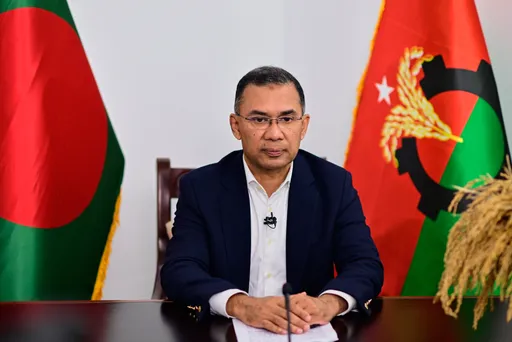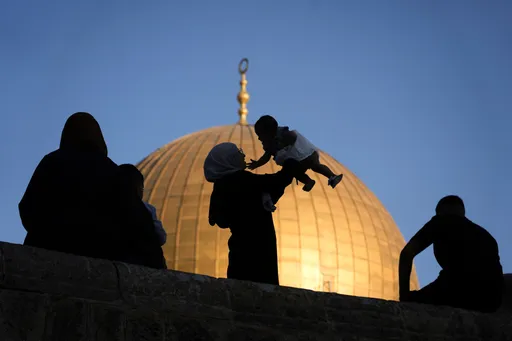The construction of a sculpture of Bangladesh’s founding father Sheikh Mujibur Rahman in the capital Dhaka has recently stirred up a political storm, pitting the South Asian nation’s Islamist groups against the secularists.
It started when Maolana Mamunul Haque, a leader of Hefazat-e-Islam, one of Bangladesh’s largest Islamic groups, asked Prime Minister Sheikh Hasina to halt the plan of erecting Rahman's statue in Dhaka.
Prime Minister Hasina is the eldest daughter of Rahman, who was assassinated along with most of his family members in 1975.
Criticising the installation of Rahman’s statue, Haque said that the move would be tantamount to betraying the soul of the departed father of the nation who was a Muslim. “Our religion (Islam) doesn’t permit the construction of any statue,” he said.
Later, Haque was endorsed by his party chief, Junaid Ahmed Babunagari, who threatened to "tear down" any sculpture set up by any party.
The provocative speeches made by the two leaders triggered protests in the country, with the leaders and activists of the ruling Awami League (Hasina’s party) taking the lead. For the Awami League, opposing the statue is equivalent to “sedition.”
Several members of the civil society have joined the protest, urging people to resist the religiously conservative groups that warn the government against installing Rahman's statue.
The protesters fear that such groups are hell bent on wiping out “secularism” from the Bangladeshi constitution. They have appealed the government to impose a ban on what they called the 'extremist' and 'sectarian' politics of Hefazat-e-Islam.
The Hefazat equation
Islamist parties in Bangladesh have often sided with the country’s centre-right Bangladesh Nationalist Party (BNP), but in the run up to the 2018 national elections, most switched side and joined hands with the ruling Awami League — a secular party by manifesto.
Hefazat-e-Islam is the second largest conservative group in Bangladesh after Jamaat-e-Islami. The unregistered force, which calls itself a 'non-political' group, supported the Awami League alliance as the polls were underway. The group has had a somewhat chequered history with the ruling party. It once accused the Hasina-led government of carrying out a “genocide by killing thousands of its men.”
Founded little less than a decade ago, Hefazat-e-Islam took the centre-stage in national politics in 2013 amidst some extraordinary circumstances.
Unlike other political outfits that operate in the capital Dhaka, the group is headquartered in the port city of Chattagram, where hundreds of madrassas draw tens of thousands of young Muslims for schooling.
Many of these madrassas use Arabic as the medium of instruction and solely focus on Islamic education. Most of Hefazat's leaders and activists, who believe in a puritanical interpretation of Islam, are the products of these schools.
On May 5 2013, Hefazat-e-Islam occupied the capital’s financial district for 12 hours, demanding the death penalty for a blogger who was accused of blasphemy. The police cleared the area late at night amid violence in which at least 39 of Hefazat activists died.
The police violence gave the party leverage against the government led by Awami League and instead of sending the blasphemy-accused to the gallows, they asked the government to recognise their madrassa certificates along the lines of a master's degree. The government agreed and the Hefazat called off the protest.
Through hardline activism, the Hefazat manages to remain relevant and on top of the news cycle. After running a campaign over several months against the presence of the statue of Greek Goddess of Justice Themis on the Supreme Court premises, the country's highest judicial body was forced to authorise its demolition on May 25 2017.
The statue carried a local touch, as it was clad in a Bangladeshi sari, blindfolded and holding scales of justice.
But this time, the Bangladeshi state feels the Hefazat has crossed the red line by campaigning against the construction of Rahman's statue.
“The same Awami League government paid heed to Hefazat’s demand in 2017 when they asked to remove the statue from the Supreme Court premise. But this time it’s not the same,” Bangladeshi political analyst, Afsan Chowdhury, told TRT World.
“Hefazat made a demand that set up a collision course with the state.”
Chowdhury said the Hefazat has failed to recognise that the decision to erect a statue of Rahman was above party politics and embodied in the collective will of the country's political establishment. “So, the opposition to the memorial statue became an opposition to the state,” he said.
“Besides, Hefazat and the Islamists have misread the state. It assumed the country's millions of religious Muslims would support their demand based on its sensitive religious symbolism. But the gamble backfired”.
A political feud, not a religious one
Chowdhury said the Awami League’s budding alliance with Hefazat was a “strategic compromise” from its part
“The party led by Hasina didn’t bring any ideological changes because of its apparent ties with Hefazat-e-Islam. It was increasingly trying to bring Islamist parties under its umbrella to grab their vote banks only.”
But it seems, Chowdhury said, the Hefazat has chosen "a wrong issue, wrong target, and a wrong person" to push its brand of Islamist politics.
Asif Shibgat Bhuiyan, a popular Bangladesh blogger on religious issues, told TRT World that it is mostly a case of using an issue and blowing it out of proportion to engage in an apocalyptic fight between hardliner Islamists and hardliner secularists.
“Both the Islamists and secularists seem to be in oblivion regarding the context in which they are operating and trying to use their populism to settle the deal. No fruitful discussion can take place in such a cauldron of mistrust and ideological chest thumping,” said Bhuiyan.
Bhuiyan pointed out that the Awami League gives space to religious populism led by parties like the Hefazat to give the country some semblance of democratic normality.
“It also strengthens its international perception as a secular government valiantly struggling with a conservative Islamist force, but sometime yielding to pressure even and should be bolstered by international support and help,” he said.
“So, it is a delicate calculation for the Awami League government to appear as a sweet-talking guardian to religious populism while also being the best fit government to restrict it to the liking of a secular world. Whether they go on with the sculpture of Rahman or not is dependent on this political subtlety more than the need of the sculpture itself”.























